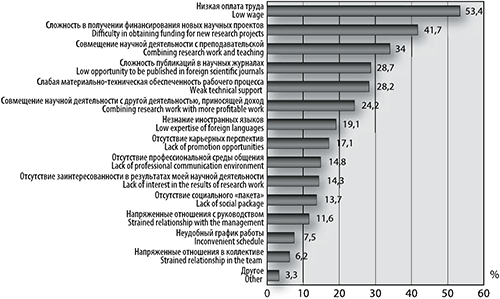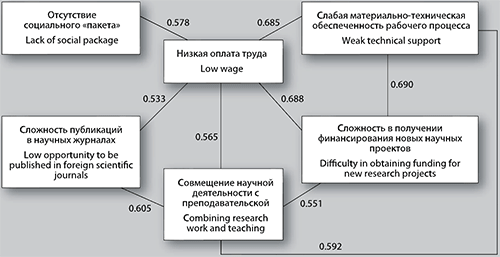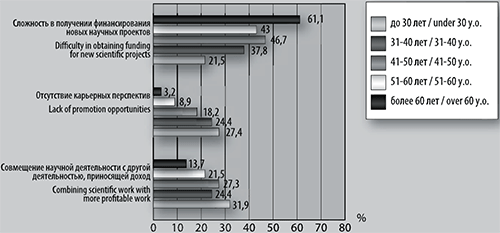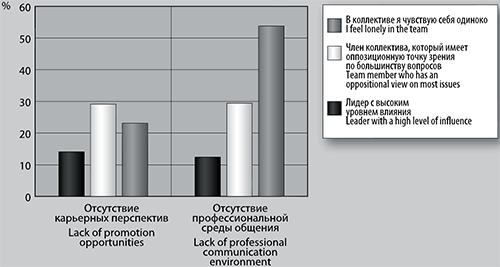Article
Sobkin V.S., Andreeva A.I., Rzaeva F.R. (2018) Researcher in the field of education: barriers in actualising scientific work. National Psychological Journal, 11(2), 135–145
Abstract
Background. The paper presents the results of a sociological study that focuses on the attitude towards the reform of the Russian researcher sphere in education. Much attention is paid to the influence of various stumbling blocks that influence the efficacy of research work. The relevance of the study is due to the psychological barriers for understanding the features of the creative self-actualised researcher.
Objective. The influence of age and social factors of professional status (e.g. scientific degree, scientific title, position) on the importance of various barriers that reduce the efficacy of scientists’ work is analyzed.
Design. According to the authorship questionnaire, which included 72 questions, 721 researchers were interviewed. The survey was conducted in different cities and towns of Russia, the respondents included those with different levels of scientific qualifications, and different experience of research work.
Results. The research showed that in the hierarchy of various barriers, those that are associated with the material and social status of the researcher are dominating. Psychological barriers themselves play an important role: lack of promotional opportunities, lack of professional communication environment, strained relations with management and colleagues. Correlation dependence between the barrier concerning funding of new projects and such motivational attitudes as aspiration to independence and professional self-actualisation are revealed. The upgraded position reduces satisfaction of material needs, and, on the other hand, the importance of those factors that concern career self-actualisation (e.g. funding a new research project) is emphasized. It is established that socio-psychological factors (satisfaction with the results of their professional activities, position in the scientific team) actualize the significance of barriers that fix the unfortunate socio-psychological relations in the team.
Conclusion. The obtained results allow to conclude that dissatisfaction with their material and social status for researchers are the most significant barriers preventing the research work. The study revealed a characteristic set of motivational attitudes related to the researcher’s desire for independence and self-actualisation. Te survey materials showed that the combination of reasech work and teaching is subjectively perceived as a barrier that prevents career self-actualisation.
Accepted: 03/26/2018
Pages: 135-145
DOI: 10.11621/npj.2018.0214
PDF: Download
Keywords: researcher; education; scientific activity; barriers; motivation; job satisfaction; sociometric status; questionnaire survey; social and professional status;
Available Online 01.08.2018

Fig. 1. Factors that reduce the efficacy of scientific work (%)

Fig. 2. Array of correlation links between barriers that reduce the efficacy of research work.

Fig. 3. Age dynamics of changing the importance of barriers affecting the efficacy of career work (%)

Fig. 4. Assessing the importance of social psychological barriers in researchers with different social status in the team (%).
Table 1. Importance of barriers affecting the efficacy of career work in researchers with different scientific degree and scientific title (%)
|
Barrier Type |
Without Scientific Degree |
Ph.D. |
Doctor |
Assistant Professor |
Professor |
|
Difficulty in obtaining funding for new research projects |
25.7 |
38.1 |
62.1 |
40.1 |
62.5 |
|
Lack of promotion opportunities |
25.0 |
18.7 |
4.6 |
19.0 |
4.8 |
|
Combining research work and teaching |
12.5 |
41.0 |
33.3 |
46.1 |
31.7 |
|
Combining research work with more profitable work |
33.8 |
24.3 |
17.0 |
21.5 |
18.3 |
Table 2. of barriers affecting the efficacy of career work in researchers who are “satisfied” and “unsatisfied” with their work results (%)
|
Barrier Type |
«unsatisfied» |
«satisfied» |
р ≤ |
|
Low wage |
68.1 |
50.0 |
.0001 |
|
Difficulty in obtaining funding for new research projects |
46.7 |
28.8 |
.0002 |
|
Weak technical support |
38.5 |
17.6 |
.000 |
|
Low opportunity to be published in foreign scientific journals |
37.4 |
15.9 |
.000 |
|
Combining research work with more profitable work |
33.3 |
5.3 |
.000 |
|
Lack of interest in the results of research work |
21.9 |
8.8 |
.0003 |
|
Lack of professional communication environment |
20.4 |
5.9 |
.000 |
|
Strained relationship with the boss |
7.0 |
18.2 |
.003 |
References:
Allahverdyan, A.G., Moshkova, G.Yu., Yurevich, A.V., & Yaroshevsky, M.G. (1998) Psychology of Science: Textbook. Moscow, Flint, 183.
Boden, R., Epstein, D., & Kenway, J. (2007) Building your academic career. Sage.
Bokhan, T.G. (2008) The problem of stress in psychology: transsexual analysis. Tomsk, 156.
Bugayeva, O.O. (2016) Emigration of scientists: «brain drain» or the possibility of integration into the world scientific space? [Aktual’nye problemy sovremennoy nauki: vzglyad molodykh], 256–261.
Dollard, J. et al. (1939) Frustration and aggression.
Fromm, E. Man for himself. Moscow: AST, 2009.
Gagne, M., & Deci, E. L., (2005) Self-determination theory and work motivation. Journal of Organizational Behavior, 26(4), 331–362. doi: 10.1002/ job.322
Hong, W., & Walsh, J. P., (2009) For money or glory? Commercialization, competition, and secrecy in the entrepreneurial university. Sociological Quarterly. 50(1), 145–171. doi: 10.1111/j.1533-8525.2008.01136.x
Jeronimus; et al. (2017) «Frustration». In Zeigler-Hill, V., & Shackelford, T.K. Encyclopedia of Personality and Individual Differences. New York, Springer, 1–8. doi: 10.1007/978-3-319-28099-8_815-1
June, D. L. (Ed.). (2012) Protection, security, and safeguards: practical approaches and perspectives. CRC Press. doi: 10.1201/b12486
Klyueva, O.A. (2016) Competitiveness of personality as a psychological phenomenon: The content of the construct and its typology. Psychology in Russia: State of the Art. 9(2), 151–166. doi: 10.11621/pir.2016.0212
Lam, A. (2011) What motivates academic scientists to engage in research commercialization: ‘Gold’, ‘ribbon’ or ‘puzzle’? Research Policy, 40, 1354–1368. doi: 10.1016/j.respol.2011.09.002
Molchanov, S.V. (2016) Moral value basis of career choice in adolescence. [Vestnik Moskovskogo universiteta]. Series 14. Psychology, 3, 81–86.
Myasishchev, V.N. (1960) The main issues and the current state of the psychology of human relations. [Psihologicheskaya nauka v SSSR]. Vol. II. Moscow, Izdatel’stvo APN RSFSR, 110–125.
Nemov, R.S. (2007) Psychological dictionary. Moscow, VLADOS, 40.
O’Leary N. et al. (2010) The Right Skills for Silver Workers: An Empirical Analysis.
Owuamalam, C.K. & Zagefka, H. (2014) On the Psychological Barriers to the Workplace: When and Why Metastereotyping Undermines Employability Beliefs of Women and Ethnic Minorities. Cultural Diversity and Ethnic Minority Psychology, 20(4), 521–528. doi: 10.1037/a0037645
Parker J. (2002) How much is a scientist worth. EMBO reports, 3, 1012–1015. doi: 10.1093/embo-reports/kvf229
Podymov, N.A. (1990) Psychological barriers in the professional career of a teacher: Doctor of psychology thesis. Moscow, 390.
Popova, I.P. (2012) Russian scientists: the study features of the professional group in the context of social transformations. [Sotsiologiya i obshchestvo: global’nye vyzovy i regional’noe razvitie: materialy 4 Ocherednogo Vserossiyskogo sotsiologicheskogo kongressa], Moscow, ROS, 3199–3206.
Preston, A. E. (2004) Leaving Science. Russell Sage Foundation.
Preston, A. E. (2006). Women leaving science. Haverford College working.
Rogers, K. (1994) Moscow, Progress; Univers, 28.
Ryan, R.M., & Deci, E.L. (2000) Intrinsic and extrinsic motivations: Classic definitions and new directions. Contemporary Educational Psychology, 25(1), 54–67. doi: 10.1006/ceps.1999.1020
Sobkin, V.S., Pisarsky, P.S., & Kolomiets. Yu.O. (1996) Teaching as a social and professional group. Moscow, Riga, Rossiyskaya akademiya obrazovaniya, TsSO RAO, 53.
Sobkin V.S. (2009) The attitude of teachers towards the Unified State Exam (based on sociological research). [Trudy po sociologii obrazovaniya]. Vol. XIII. Issue XXIII. Moscow, Institut sotsiologii obrazovaniya RAO. 233.
Sobkin, V.S., & Adamchuk, D.V. (2016) Modern Teacher: Life and Career landmarks. [Trudy po sociologii obrazovaniya]. Vol. XVIII. Issue XXX. Moscow, FGBICU «IUO RAO», 216.
Sobkin, V.S., Tkachenko, O.V., Fedyunina, A.V. (2005) Student of a teacher-training university: attitude to education and career plans. [Voprosy obrazovaniya], 1, 304–319.
Sobkin, V.S., & Belova, O.V. (2010) The quality of teacher-training education by the eyes of a student. [Pedagogika], 5, 10–17.
Sobkin, V.S., Tkachenko, O.V., & Fedyunina, A.V. (2004) Satisfaction with the quality of education: student opinions and assessments. [Sotsiologiya obrazovaniya. Trudy po sotsiologii obrazovaniya]. Vol. IX. Issue XV. Moscow, TsSO RAO, 444.
Sobkin, V.S., Andreeva, A.I., & Rzaeva, F.R. (2017) Professional mobility of researchers in the field of education [Pedagogika],1, 42–57.
Sobkin, V.S., Andreeva, A.I., & Rzaeva, F.R. (2017) The attitude of scientists towards the reform of the Russian science of education (based on the sociological survey). [Tsennosti i smysly], 4 (50), 34–43.
Sobkin, V.S., Andreeva, A.I., & Rzaeva, F.R. (2017) On the question of the value orientations of researchers in the field of education. National Psychological Journal, 2 (26), 106–115. doi: 10.11621/npj.2017.0212
Sobkin, V.S., Andreeva, A.I., Rzaeva, F.R. (2017) The social well-being of research staff: life. [Vestnik Tyumenskogo gosudarstvennogo universiteta], 1, 8–31.
Shakurov R.Kh. (2003) Psychology of meanings: the theory of overcoming. [Voprosy psikhologii]. 5, 18–33.
Videneev, N. V. (1989) The nature of man’s intellectual abilities. Moscow, Mysl’,173.
Winter, I.A. (1991) Psychology of teaching foreign languages in school. Moscow, Prosveshchenie, 222.For citing this article:
Sobkin V.S., Andreeva A.I., Rzaeva F.R. (2018) Researcher in the field of education: barriers in actualising scientific work. National Psychological Journal, 11(2), 135–145


